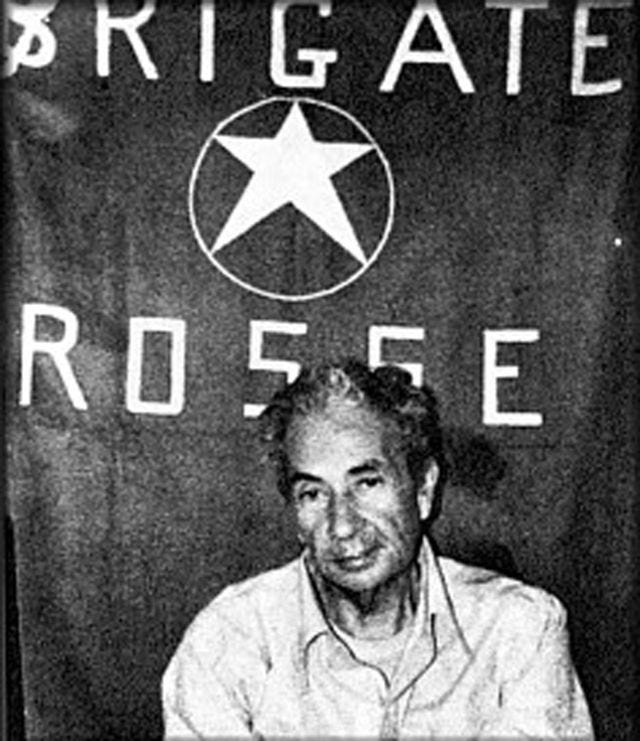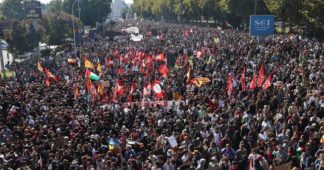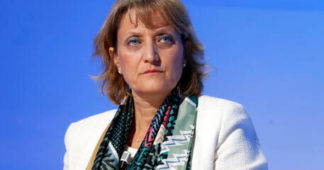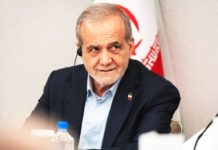By Kit Klarenberg and Wyatt Reed – The Grayzone
Oct 05, 2025
A roving reporter who covered Italy’s top politicians explains to The Grayzone how his country was reduced to a joint US-Israeli “aircraft carrier,” and raises troubling questions about an Israeli role in the killing of Prime Minister Aldo Moro.
For years, Israel’s Mossad monitored and secretly influenced a violent communist faction that carried out the March 16, 1978 kidnapping and murder of Italian statesman Aldo Moro, veteran investigative journalist Eric Salerno has documented.
Having worked closely alongside multiple Italian heads of state during his 30-year career as a correspondent, Salerno published an expose of their secret relationship with Israeli intelligence in 2010 called Mossad Base Italy.
The reporter told The Grayzone that Moro, who was arguably Italy’s most important leader, became a thorn in the side of powerful forces who sought to keep his country firmly lodged in the pro-Western bloc. Salerno believes Italy’s long-term foreign policy would have developed differently if Moro had survived, adding, “that’s what they were afraid of in the United States.”
Moro was kidnapped in 1978 by the radical Brigate Rosse, or Red Brigades faction, in a daring and highly-professional daytime operation which left all but one of his bodyguards dead. He was executed two months later. The still-unresolved case shocked the nation, and remains a deeply unsettling chapter in the period of intelligence intrigues and political terrorism known by Italians as The Years of Lead.
For some of Italy’s most knowledgeable sources, the crimes bore strong similarities to those of Operation Gladio, a covert effort which saw the CIA, MI6 and NATO train and direct a shadow army of fascist paramilitary units across Europe that carried out false flag terror attacks, robberies, and assassinations aimed at neutralizing the socialist left.
Moro, who belonged to the progressive wing of the Christian Democrat Party and served five terms as prime minister, threatened to upend the traditional postwar order in Italy by forging a “compromesso storico” (historic compromise) with the Italian Communist Party. “It was something that probably part of the Italian political establishment was afraid of, even in his own party,” Salerno notes.
While this part of Moro’s history is well known among Italians, Salerno has documented a less understood aspect of his legacy: his arrangement with Palestinian resistance groups, likely mediated by Libyan President Moammar Gaddafi, which allowed the PLO and others to smuggle weapons and travel freely through Italy in exchange for the country itself being spared from terror attacks. That deal, which scholars consider to be an evolving and “dynamic process,” came to be known as the “Lodo Moro.”
The pact is widely believed to have been forged in 1973, during Moro’s tenure as foreign minister, when Italy secretly released a group of Palestinian fighters who sought to attack a plane belonging to Israel’s El Al airline as it departed from Rome’s Fiumicino airport. It was spurred in large part by Italy’s desire to maintain a level of independence from the US-led Western bloc, which was targeted by an oil embargo in retaliation for Washington’s support for Israel in the 1973 Arab-Israeli War.
While Salerno stopped short of alleging the Mossad directly ordered the abduction and execution of Moro, he told The Grayzone, “I think their idea was, ‘we’ll see what happens, and if it’s necessary, and we think it’s the right time, we can help one way or another.’”
For over a decade, the Lodo Moro deal insulated Italy from the violence that plagued other nations across the Mediterranean. These plots became increasingly commonplace in the region following the 1967 Six-Day War between Israel and a coalition of Arab states including Egypt, Syria, and Jordan.
But it was only a matter of time before the violence consumed Moro’s life as well.

.
Mossad Base Italy
Salerno’s book, Mossad Base Italy, is perhaps the most comprehensive chronicle of the intimate and ongoing relationship between Israeli intelligence and Italy’s political leadership. Published in 2010, the book remains almost completely unknown in the English speaking world.
Its author illustrates how the secret Israeli-Italian alliance predated the May 1948 creation of Israel, with Rome providing covert support to Zionist militias like the Haganah. Individuals affiliated with Benito Mussolini and neofascists within Italy’s post-war security apparatus supplied them with weapons and training to crush Palestinian resistance and assist their campaign of ethnic cleansing.
“The Israelis didn’t want Rome to become a satellite of the Soviet Union, and the US had the same position. The country was essentially the West’s front line against the Eastern bloc,” Salerno explained to The Grayzone. “Italy bordered Yugoslavia, was not far from Warsaw Pact nations, and support for Communism and the Soviet Union was strong in the wake of World War II. It was also a kind of aircraft carrier in the Mediterranean, which people would land on and go off to other places.” With nearly 5,000 miles of coastline, and just 90 miles separating the island of Sicily and Tunisia, Italy has often been described as the “gatekeeper” of the Mediterranean Sea.
Salerno concluded that every Italian administration since World War II has secretly aided Mossad and Israeli military intelligence. A review of his book by veteran Haaretz intelligence correspondent Yossi Melman noted, “Israeli espionage agents confirm that Italy’s intelligence services are among the friendliest in the world toward their Israeli counterparts.”
Salerno argues persuasively that both the Mossad and Israeli Air Force were effectively “born in Rome,” and reveals Tel Aviv entrusted Italian intel with conducting “extremely classified missions” on their behalf. Strikingly, his book has never been translated into English.
The reporter attributes the consistent pro-Israel bias of Italian intelligence to a combination of political expediency and lingering collective guilt over Rome’s complicity in the crimes against Jews during World War Two. Since then, Italy’s governments have largely “felt… that they had to help the Jews because the Jews had been suffering under the previous regime.”
“Objective evidence” Mossad downed Italian airliner
The traditional dynamic between Rome and Tel Aviv was challenged by the emergence of Italian Christian Democrat Party governments, including Moro’s. Within months, Israel began responding to this defiance with apparent acts of sabotage inside Italy, according to a variety of well-placed figures.
In late 1973, five members of the Black September Palestinian militant group were arrested thanks to a tipoff from the Mossad, which claimed they were preparing to shoot down an Israeli commercial airliner at Rome’s largest airport with ground-to-air missiles. However, Moro arranged for them to be released a month later, then transported to Libya.
The Black September members were first flown to Malta on an Italian transport plane known as Argo 16 — which was routinely used to ferry Operation Gladio operatives to a secret training base in Sardinia, and deliver CIA/MI6 weapons to secret depots dotted around the country. When Mossad observed the Palestinians there and realized they’d been freed, they became “very annoyed,” according to Rome’s then counterespionage chief, Ambrogio Viviani.
On November 23 1973, Argo 16 crashed shortly after taking off from Venice Airport, killing the entire veteran crew.
An initial probe concluded the tragedy was an accident, but the case was reopened by the Venice prosecutor’s office in 1986. That investigation faltered as well, when security and intelligence officials refused to testify, and began withholding evidence. However, the judge overseeing the case, Carlo Mastelloni, told Salerno there was no doubt, based on “objective evidence,” that the plane’s downing was Israel’s dirty work.
“It’s all tied to the famous ‘Moro agreement,’” Mastelloni asserted. Argo 16’s sabotage was not only “retaliation” for the release of the arrested Palestinians, but a “warning” over Italy’s “concessions” to “Tel Aviv’s enemies,” he stated. Still, Lodo Moro continued to hold despite the implicit threat of violence, which raises the question of whether Mossad felt the need to up the ante.
‘Mossad decided to transfer the Middle Eastern conflict to Italy’
Argo 16 was not the only fatal incident to take place during Italy’s Years of Lead which seemed to bear the Mossad’s fingerprints. When a hand grenade was lobbed at Milan’s police headquarters in May 1973, killing four civilians and injuring 45, the culprit presented himself as an anarchist following his immediate apprehension. However, subsequent investigations revealed the perpetrator, Gianfranco Bertoli, to be a longtime Italian military intelligence informant, as well as a member of numerous neofascist organizations, including the Gladio-linked Ordine Nuovo (New Order).
Bertoli had spent the two years leading up to the attack residing off and on in Kibbutz Karmiya in Israel, where he frequently hosted representatives of French far-right faction Jeune Révolution, while maintaining contact with French intelligence. Such incidents prompt Salerno to ask: “was the Mossad part of the strategy of tension?” This was the precise conclusion reached by Ferdinando Imposimato, an Italian magistrate who oversaw initial trials of Red Brigades operatives regarding Moro’s murder.
“It must be acknowledged the Israeli secret services had perfect knowledge of the Italian subversive phenomenon from its very beginning, engaging in it with constant ideological and material support,” Imposimato noted in 1983. “Mossad had decided to transfer the Middle Eastern conflict to Italy,” he concluded, “driven by the aim of political and social destabilization.” Israel’s purpose was “to induce America to see Israel as the only allied point of reference in the Mediterranean and thus gain greater political and military support,” he stated.
During his March 1999 testimony to a parliamentary inquiry into terrorism in Italy, Red Brigades fighter Alberto Franceschini stated the group was approached by the Mossad through an intermediary after the Red Brigades’ kidnapping of a magistrate named Mario Sossi in April 1974. According to Franceschini, the Mossad made a “disturbing” proposition to finance his group, stating that rather than seeking to control the Red Brigades, Israel sought only to ensure the group continued to operate:
“We don’t want to tell you what you have to do. That is, what you do is fine with us. We care that you exist. The very fact that you exist, whatever you do is fine with us.”
Describing “the political motivations” for Mossad’s position, Franceschini noted: “from the perspective of American relations… the more destabilized Italy was, the more unreliable it became, and the more Israel became a reliable country for all Mediterranean policies” from Washington’s perspective. In his final years, Franceschini revealed Israel “offered weapons and assistance” to the Red Brigade, declaring: “their stated goal was to destabilize Italy.”
As Salerno noted to The Grayzone, “in one of his last interviews,” Franceschini “confirmed to my colleague from Corriere della Serra that the Mossad had been in contact from the very beginning with the Red Brigades,” interactions which the correspondent stresses were “very normal in the way the Mossad acted with all kinds of, let’s call them subversive organizations, all over Europe.”
The notion of a potential Israeli hand in shaping the Moro plot — or hindering efforts to resolve it peacefully — is bolstered by statements from a number of influential Italian politicians, which also indicate Israel both “co-financed” and “influenced” the group which took credit for killing Moro. These disclosures have so far been universally ignored by mainstream English-language outlets.
In July 1998, Giuseppe De Gori, a lawyer who represented Moro’s Christian Democrat party in numerous trials related to the case, told a parliamentary commission on terrorism that Mossad “had always controlled” the Red Brigades, without formally infiltrating the group. He recorded how in 1973, a Mossad major and colonel “presented themselves” to the group, exposing infiltrators in their ranks, and offering “weapons and whatever they wanted as long as they pursued a different policy.”
While the Red Brigades refused, “from that moment on, it was clear Mossad” kept a close eye on the militant faction. De Gori testified that Israeli intel “hated” the “anti-Zionist” Moro, and began taking advantage of its ability to “smuggle” information to the Red Brigades, which could influence their actions.
As the lawyer explained, there was “no need” for the Mossad to directly penetrate the Red Brigades. De Gori hinted the group’s decision to kill Moro after almost two months in captivity resulted from such indirect Israeli intervention. While Italian government officials refused any negotiation with his kidnappers, at a private meeting on May 8, 1978, elements within the Christian Democrats proposed independently brokering a deal to secure Moro’s release.
“Moro was killed immediately afterward, so someone must have been there who reported this news,” De Gori testified. In 2002, the lawyer told author Philip Willan that Mossad made Moro’s execution a fait accompli by enlisting the services of a skilled forger to fabricate a letter from the Red Brigades to authorities in mid-April 1978. The communique claimed the statesman was already dead. “After that… Moro could no longer be saved,” De Gori stated.
Bargain with Palestinian resistance puts target on Moro’s back
De Gori is not the only well-placed source to blame Mossad for Moro’s death. In May 2007, Giovanni Galloni, former vice president of the Italian judiciary’s High Council, boldly proclaimed that “not all participants” in the premier’s abduction had been members of the Red Brigades. That conclusion was spurred by Moro’s bodyguards being executed with “just two weapons, used by exceptionally experienced men.” In addition to never being identified, these assassins displayed a level of shooting expertise no known Red Brigades operative seemed to possess.
Galloni strongly insinuated the killers were hired by Washington and/or Tel Aviv. He revealed that “a few months before his capture,” Moro confided to him that he was “worried” the US and Israeli “secret services had infiltrated the Red Brigades.” Moro reported this to Italy’s US ambassador, prompting an “ambiguous denial” from the State Department, to the effect Washington had always told Italian intelligence “everything we know.”
Galloni enquired: “Which secret services? The real ones, or the ones that were in their hands?” He was clearly referring to the parallel Anglo-American spying and terror nexus in Rome known as Operation Gladio.
Further evidence of an Israeli role in Moro’s murder can be found in testimony delivered to an Italian parliamentary committee in June 2017 by a former magistrate named Luigi Carli, who was intimately involved in the original investigation. Unnoticed in the English-speaking world, and unmentioned in the committee’s official reports, Carli claimed the Red Brigades had been “co-financed” by Mossad.
When asked why Israel would subsidize an armed communist faction in Italy, Carli stated that “several” former Red Brigades collaborators had told him the Mossad had agreed to “take care of co-financing the Red Brigades,” proposals which he considered “strange.”
They explained, however, that any efforts which ended up “weakening, or helping to weaken, Italy’s internal situation” would “enhance Israel’s prestige and authority” in the Mediterranean, Carli testified.
Highly illuminating interviews with former Italian president Francesco Cossiga, published by the Bulletin of Italian Politics in the wake of his death in August 2010, shed further light on Mossad’s motives for assassinating Moro, and for targeting Rome with mass casualty false flag bombings. Cossiga was the first Italian politician to acknowledge the existence of the Lodo Moro. Cossiga stated the US was “of course” aware of the agreement, while he himself and much of Italy’s political class were in the dark.
Cossiga recalled that while he was Prime Minister in November 1979, police in a coastal town intercepted a truck carrying a surface-to-air missile. He subsequently received a telegram from Popular Front for the Liberation of Palestine chief George Habbash admitting ownership of the missile, and reassuring the Italian premier it was not intended for use in Italy. Habbash thus demanded the weapon be returned and called for the driver’s release.
Habbash warned that any failure to comply would represent a violation of the PFLP’s “agreement” with Rome. “No one could tell me what this part meant,” Cossiga insisted. Only “many years later” did he learn of the Lodo Moro agreement.
At the time of Cossiga’s interviews, the Italian state reopened investigations into the August 1980 bombing of Bologna Centrale railway station, which killed 85 people and wounded over 200. The probe resulted in convictions in absentia for members of the neofascist, Gladio-tied Nuclei Armati Rivoluzionari. Several chief suspects, including a confirmed MI6 asset named Robert Fiore, escaped to London, where Britain refused to extradite them. The Bulletin of Italian Politics identified the missile seizure, and the existence of Lodo Moro itself, as key considerations in the new investigation.
One possibility explored by the inquiry was whether the Bologna bombing was “carried out by the US or Israel to punish Italy for its pro-Arab stance.” Having long complained that Rome “never really had space for its own foreign policy” due to its subservience to US interests, Cossiga acknowledged that Italy “pursued a national agenda” in the Middle East and “took certain liberties towards the Arab world and Israel.”
“People forget” the Christian Democrats were “always a pro-Arab party,” Cossiga stated, pointing specifically to Moro and his associate Giulio Andreotti, another former Italian head of state who famously exposed Operation Gladio in October 1990. Cossiga claimed, “Andreotti has always believed — though he’s never said it,” that the US caused him “judicial problems” over his Arab sympathies.
Though Salerno disputes the characterization of Andreotti as “pro-Arab,” describing him instead as “pro the rights of Arabs,” he told The Grayzone that the longtime Italian leader once personally declared to him: “if I was born in Gaza, I would be a terrorist.”
Moro rescue committee set up to fail
Throughout Moro’s 55 days in Red Brigades captivity, Italian officials declared that the “state must not bend” to “terrorist demands,” making it clear the Italian government would neither negotiate with the Red Brigades nor release any of its jailed members in return for the PM. The former Italian Prime Minister was subsequently bundled into a car trunk, shot 10 times, and left in the vehicle in central Rome for authorities to find.
Today, many Italians view Rome’s inflexible approach with deep suspicion, given the government’s willingness to negotiate with terrorists both before and after Moro’s murder. Magistrate Mario Sossi, whose kidnap by the Red Brigades purportedly prompted Mossad to approach the group, was released in 1974 after one month in captivity in exchange for some of the radical faction’s imprisoned members.
When the Red Brigades kidnapped Christian Democrat politician Ciro Cirillo in April 1981, Italian authorities bargained directly with his abductors, paying a ransom for his release. That December, when the Red Brigades abducted US General James Dozier, he was “located and freed in a blitz” by a joint US-Italian taskforce.
Former Italian general Roberto Jucci contrasted Dozier’s treatment with that of Moro in a 2024 interview. “One of them, they wanted to set free; I have my doubts about the other,” he stated. Jucci was among the few Italians in a position to judge, having been placed in charge of training a special forces squad at a base in Tuscany, which was ostensibly meant to rescue the abducted Prime Minister. Today, he believes “the real goal was to get me out of the way” and ensure Moro was never found. No raids were conducted during his 55 days in captivity.
Jucci told La Repubblica that the formal committee to rescue Moro was “advised by a man sent by the US,” and “composed largely” of representatives of fascist, Gladio-affiliated Masonic lodge P2. These individuals “wanted things to go in a different way from what all honest people were asking for,” and wished for Moro “to be destroyed politically and physically.”
Had Moro survived, “Italy’s politics would have developed differently.” Jucci believed the Italian leader could’ve “been freed if all the institutions had worked in this direction.” Declassified British Ministry of Defence files dating to November 1990 show officials in London were well-aware of the role played by P2 in sabotaging official efforts to rescue Moro. The Masonic lodge was described as just one “subversive” force in Rome, employing “terrorism and street violence to provoke a repressive backlash against Italy’s democratic institutions.”
Those documents further noted “circumstantial evidence” indicated “one or more of Moro’s kidnappers was secretly in touch” with Italy’s “security apparatus,” and investigators “deliberately neglected to follow up leads which might have led to the kidnappers and saved Moro’s life.”
Mossad continues Italian ops amid Gaza genocide
Today, there is little trace of any pro-Arab tendencies in mainstream Italian politics. According to Salerno, the US and Israel no longer have any need to “destabilize Italy” as the country is economically “weak.” Rome’s government now is for all intents and purposes “a continuation, even an extension, of the old fascist regime,” he says, adding, “there are people in the government that have statues of Mussolini in their houses.”
Prime Minister Giorgia Meloni has made clear she harbors little sympathy for the Palestinians, and little intention of recognizing a Palestinian state – even after it was revealed in November 2024 the Mossad had been employing a private Italian intelligence firm to target Meloni and her ministers. “I think that basically, the government that we have here in Italy at the moment is a government that would like to criticize many things that are happening,” but “it can’t criticize Israel too much because of what the Italian fascist regime did to the Jews during the war,” Salerno explains.
Regarding recent mass protests and strikes across Italy in support of Gaza, Salerno explains, “What is happening today in Palestine in Gaza is something exceptional.” But “as nothing has been taught or spoken about in Italy about the plight of Palestinians for many years… the great population of Italy and the governments of Italy” have “never done very much to really help the Palestinians.” Now, once again, “all of a sudden, we have discovered we have the Middle East and the Palestinian question.”
To this day, Mossad continues to carry out operations in Italy. The Italian-Israeli intelligence relationship was most recently highlighted in a bizarre incident in May 2023, in which a houseboat capsized in Italy’s Lake Maggiore, killing four people among the 23 aboard. Though legacy media initially framed the case as a tragic accident at a birthday celebration, it quickly became clear everyone on the boat — bar the captain and his wife — were Israeli and Italian spies.
The 10 surviving Israelis were hurriedly flown back to Tel Aviv on a military aircraft before they could be questioned by police, with the apparent blessing of Italian authorities. Subsequent investigations suggested the gathering was a joint intelligence operation into “Iranian non-conventional weapons capabilities,” aimed at either surveilling local industry or wealthy Russians living nearby who were suspected of helping Moscow obtain drones from Tehran.
A eulogy for the dead Israeli spy, whom Italian media named as Erez Shimoni, was personally delivered by Mossad director David Barnea, strongly suggesting he was a significant figure at the intelligence agency. While the captain of the ship has since been convicted of negligent homicide, Italy’s military police immediately announced they would not be investigating the activities of the spies on board.
We remind our readers that publication of articles on our site does not mean that we agree with what is written. Our policy is to publish anything which we consider of interest, so as to assist our readers in forming their opinions. Sometimes we even publish articles with which we totally disagree, since we believe it is important for our readers to be informed on as wide a spectrum of views as possible.











